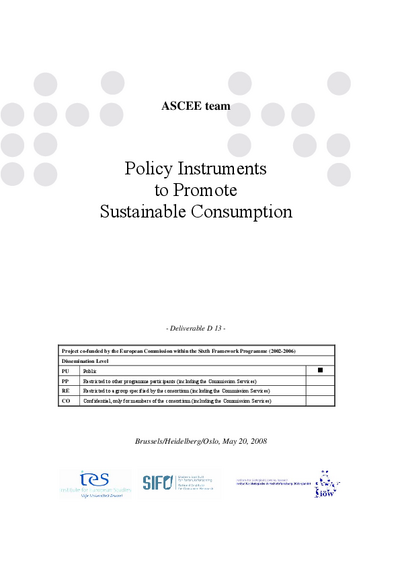Policy Instruments to Promote Sustainable Consumption
The ASCEE project deals with innovative instruments to strengthen sustainable consumption.
Its empirical basis consists of about 80 interviews and nine case studies of
which the core features of four (Green Funds Scheme, Red/Green Calculator, “We‘re in this together” and “One Tonne Less”) are presented in the report.
The report begins with general considerations on policy making to promote sustainable consumption (SC). We refer to windows of opportunity for consumers, which can be created by market actors and by political authorities. With respect to the role of public authorities in SC policy, we observe that elements of traditional government actions are linked with governance, but that the new policy design is not linear. It changes mode and design during the policy process. The policy process generates different types of interventions
and instrumental measures. To illuminate their impact, a new perspective was taken dividing policies in terms of their contribution to changing consumer behavior and grouping them along three dimensions; namely raising awareness, making sustainable consumption easy, and greening of markets.
Policy instruments on sustainable consumption should be assessed ex ante (i.e. prior) to provide preliminary insights into potential impacts. Due to a lack of ready-made assessment tools, the ASCEE project developed an own assessment tool and applied it to various cases.
These general considerations and our empirical work delivered interesting insights:
Current priorities of governmental intervention address the supply side. Few measures put the consumers in the spotlight, and they are often confined to the provision of information, such as with eco-labels and consumer awareness-campaigns. We argue for a stronger sustainable consumption-related policy field. Its policy design has to be based on a crystal clear understanding of the state as institution arranging the framework. Framework setting is a core task of policy and the clear and committed involvement of public authorities to arrange a policy framework is necessary. Policy cannot be outsourced.
The success of SC policies is, to a large degree, dependent on the involvement of all strategic stakeholder groups. This does not imply, however, that action of as many stakeholders as possible should be encouraged. Rather, the challenge is to integrate the right stakeholders at the right point of policy formulation and implementation.
Though ‘real’ innovation can rarely be found in policy designs, the ASCEE project
identified four novel elements with respect to modern SC policies:
Collective action is a key. To overcome motivational barriers, collective action should be organised within which people can share experiences with changes in everyday life.
Adaptability is crucial. The need to adapt policy instruments to altered market circumstances will be a continuing challenge, assuming that product innovation remains a major force in saturated consumer goods markets.
A solid evidence base is essential. Public policies should pay more attention to the generation and exchange of socio-economic consumer-related data.
The social dimension is another new element which needs to be taken into account more than is the case nowadays.
We close the report with eight core recommendations:
- Take multiple roles designing and implementing a policy to promote SC.
- Design and support an SC policy that activates relevant stakeholders.
- Find appropriate forms of institutionalisation for the SC policy.
- Try to exploit the full potential of more sustainable consumption patterns.
- Develop, support and use instruments with high built-in adaptability
- Seek an instrumental design that provides collectivity, feedback and solutions.
- Create a sound evidence-base for policy design, connecting life cycle and market data, with socio-economic data on consumer behaviour
- Monitor and assess policy impacts as part of a continuous improvement process (CIP)



